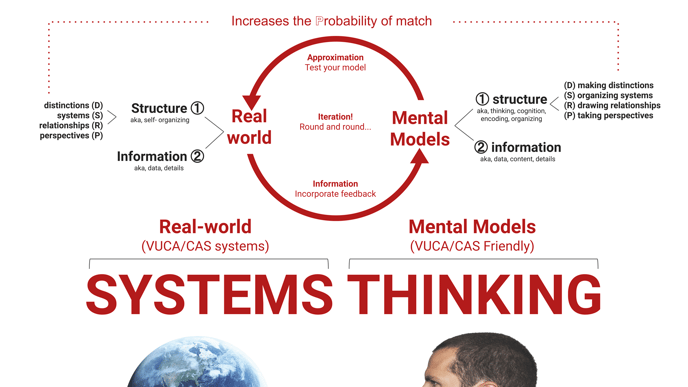Short answer: yes. Medium answer: yes and no. Longer answer below...
A number of practitioners, popularizers, and even a few scholars of systems thinking will say things like:
- There is no system in nature
- Systems are not real.
- Distinctions, systems, relationships, and perspective are merely constructions of the mind.
- Nature just 'is'.
I understand that this is a popular opinion which many casually treat as obvious 'fact.' Indeed, it is often the case that this rationale is used as a form of quippy epithet, hurled at some unsuspecting author as a comment on a post. Despite the diminutive size of these abrupt, snippy comments, there is a lot behind their dripping-sarcasm. Just one example of thousands is acclaimed Critical Systems Theorist, Mike Jackson, to an article the map not being the territory [1].
Luke, you might find it easier to convince people about the treachery of systems maps if you stopped talking as though there are systems in the world to map. [emphasis added]
This opinion, however, is far from factual. Indeed, there is far more empirical evidence (by orders of magnitude) supporting the contrary—that systems can be real. In reality, the situation is more complex—more nuanced and less absolute—than what is conveyed by these sentiments. Systems exist in both mind and nature [2].
Systems are real. Distinctions are real. Relationships are real. And, perspectives are real. And, they are also products of the mind. Sometimes the mind’s DSRPs match up with nature’s DSRPs. Often they don’t. But that is not the same as the DSRPs don’t exist in nature or that they only exist in mind.
What DSRP Theory explains is that these structures exist in both mind and nature. I agree with the sentiment that “nature just is,” but this doesn’t mean that nature isn’t structured, nor does it mean that nature is in any meaningful way one single homogenous whole with no meaningful internal structure. It doesn’t mean that nature does’t create boundaries, part-whole systemic structure, interrelationships, and perspectives that dramatically effect behavior and systemic emergence.
Is our understanding of nature and nature itself intersubjective? Sure it is. But again, this does not conflict with the idea that nature creates these structures. It simply says that the "map is not the [same as the] territory." It doesn't say that the contours in the map are not analogous to the the contours on the land.
Can the structures we see in our minds be biased, subjective, incomplete, or flat wrong? Yes! They often are. But again, this is not in conflict with nor is it the same as saying that ‘such structures do not emerge from nature’—they do. For example, there are literally countless examples of nature’s boundary distinctions (e.g., cell walls, skin, atmospheres, mountains ranges, genetics, etc) that really exist and effect how systems in nature behave whether or not we perceive them as such. The high prevalence of us getting these boundary-distinctions wrong is not the same as these boundary-distinctions not existing in nature.
Indeed, the very essence and crux of systems thinking is to try to increase the probability that our mental systems are good approximations of these natural systems. In so doing we are matching the structures of mind to the structures of nature. All the more reason to train your mind to speak the language of nature. That is the essential thrust of DSRP.

For those interested in many more examples and empirical evidence of such, see Cabrera, D., Cabrera, L., and Cabrera, E. (2021) A Literature Review of the Universal and Atomic Elements of Complex Cognition. In, Routledge Handbook of Systems Thinking, (Eds) Cabrera, D., Cabrera, L. and Midgley, G. Routledge. London, UK.
References and Endnotes
